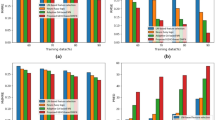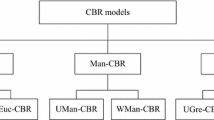Abstract
Accurate and credible software effort estimation is a challenge for academic research and software industry. From many software effort estimation models in existence, Estimation by Analogy (EA) is still one of the preferred techniques by software engineering practitioners because it mimics the human problem solving approach. Accuracy of such a model depends on the characteristics of the dataset, which is subject to considerable uncertainty. The inherent uncertainty in software attribute measurement has significant impact on estimation accuracy because these attributes are measured based on human judgment and are often vague and imprecise. To overcome this challenge we propose a new formal EA model based on the integration of Fuzzy set theory with Grey Relational Analysis (GRA). Fuzzy set theory is employed to reduce uncertainty in distance measure between two tuples at the k th continuous feature \( \left( {\left| {\left( {{x_o}(k) - {x_i}(k)} \right.} \right|} \right) \).GRA is a problem solving method that is used to assess the similarity between two tuples with M features. Since some of these features are not necessary to be continuous and may have nominal and ordinal scale type, aggregating different forms of similarity measures will increase uncertainty in the similarity degree. Thus the GRA is mainly used to reduce uncertainty in the distance measure between two software projects for both continuous and categorical features. Both techniques are suitable when relationship between effort and other effort drivers is complex. Experimental results showed that using integration of GRA with FL produced credible estimates when compared with the results obtained using Case-Based Reasoning, Multiple Linear Regression and Artificial Neural Networks methods.













Similar content being viewed by others
References
Albrecht SJ, Gaffney JR (1983) Software function, source lines of code, and development effort prediction: a software science validation. IEEE Transactions on Software Engineering 9:639–648
Auer S, Biffl M (2004) Increasing the Accuracy and Reliability of Analogy-Based Effort Estimation with Extensive Project Feature Dimension Weighting, Proceedings of the International Symposium on Empirical Software Engineering (ISESE’04), pp 147–155
Azzeh M, Neagu D, Cowling P (2008a) Fuzzy Feature subset Selection for Software Effort Estimation, International workshop on software predictors PROMISE'08 (part of ICSE'08). Leipzig, Germany, pp 71–78
Azzeh M, Neagu D, Cowling P (2008b) Software project similarity measurement based on Fuzzy c-Means. International Conference on software process, Leipzig, pp 123–134
Briand L, Langley T, Wieczorek I (2000) using the European Space agency data set: a replicated assessment and comparison of common software cost modelling techniques, 22 nd IEEE international conference on software engineering.
Boetticher G, Menzies T, Ostrand T (2007) PROMISE Repository of empirical software engineering data http://promisedata.org/ repository, West Virginia University, Department of Computer Science.
Chiu N-H, Huang S-J (2007) The adjusted analogy-based software effort estimation based on similarity distances. J Syst Software 80:628–640
Chen Z, Menzies T, Port D, Boehm B (2005) Feature subset selection can improve software effort estimation accuracy, workshop predictor models in software Eng. PROMISE ’05. ACM, St. Louis, Missouri, USA, 1–6
Deng J (1989a) Introduction to grey system theory. J Grey Syst 1:1–24
Deng J (1989b) Grey information space. J Grey Syst 1:103–117
Dolado JJ (2001) On the problem of the software cost function. Journal of Information and Software Technology 43:61–72
Haykin, S. (1999) Neural Networks: A Comprehensive Foundation, Prentice Hall, ISBN 0-13-273350-1.
Hsu CJ, Huang CY (2007) Improving Effort Estimation Accuracy by Weighted Grey relational Analysis During Software development, 14th Asia-Pacific Software Engineering Conference, pp. 534–541.
Huang S-J, Chiu N-H, Chen L-W (2007) Integration of the grey relational analysis with genetic algorithm for software effort estimation. European Journal of operational and research 188:898–909
Huang SJ, Chiu NH (2006) Optimization of analogy weights by genetic algorithm for software effort estimation. Journal of Information & software technology 48:1034–1045
Idri A, Abran A, Khoshgoftaar T (2001) Fuzzy Analogy: a New Approach for Software Effort Estimation, 11th International Workshop in Software Measurements, pp. 93–101.
ISBSG (2007) International Software Benchmarking standards Group, Data repository release 10, web site: http://www.isbsg.org (visited 20 August 2008).
Jorgensen M, Indahl U, Sjoberg D (2003) Software effort estimation by analogy and “regression toward the mean”. J Syst Software 68:253–262
Kemerer CF (1987) An empirical validation of software cost estimation models, Comm. ACM 30:416–429
Keung J, Kitchenham B (2008) Experiments with Analogy-X for software cost estimation, 19th Australian Conference on software engineering, pp. 229–238.
Kirsopp C, Shepperd M (2002) Case and Feature Subset Selection in Case-Based Software Project Effort Prediction, Proceedings of 22nd International Conference on Knowledge-Based Systems and Applied Artificial Intelligence (SGAI'02).
Kirsopp C, Shepperd MJ, Hart J (2002) Search Heuristics, Case-based Reasoning and Software Project Effort Prediction, Proceedings of the Genetic and Evolutionary Computation Conference, pp. 1367–1374.
Li J, Ruhe G (2008a) Multi-criteria decision analysis for customization of estimation by analogy method AQUA + , International workshop on software predictors PROMISE'08. Leipzig, Germany, pp 55–62
Li J, Ruhe G (2008b) Analysis of attribute weighting heuristics for analogy-based software effort estimation method AQUA+. Journal of Empirical Software Engineering 13:63–96
Liebchen G, Shepperd M (2008) Data sets and data Quality in software engineering, International workshop on software predictors PROMISE'08. Leipzig, Germany, pp 39–44
Mair C, Kadoda G, Lefley M, Phalp K, Schofield C, Shepperd M, Webster S (2000) an investigation of machine learning based prediction systems. J Syst Software 53:23–29
Martin C L, Pasquier J L, Yanez C M, Gutierrez A T (2005) Software Development Effort Estimation Using Fuzzy Logic: A Case Study, proceeding of Sixth Mexican International Conference on Computer Science (ENC'05), pp. 113–120.
Mendes E, Mosley N, Counsell S (2003) A replicated assessment of the use of adaptation rules to improve Web cost estimation, International Symposium on Empirical Software Engineering, pp. 100–109.
Mendes E, Watson I, Triggs C, Mosley N, Counsell S (2003b) A comparative study of Cost Estimation models for web hypermedia applications. Journal of Empirical Software Engineering 8:163–193
Mittas N, Athanasiades M, Angelis L (2007) improving analogy-based software cost estimation by a resampling Method, Journal of Information & software technology.
Myrtveit I, Stensrud E (1999) A controlled experiment to assess the benefits of estimating with analogy and regression models. IEEE transactions on software engineering 25:510–525.
Shepperd MJ, Schofield C (1997) Estimating software project effort using analogies. IEEE Transaction on Software Engineering 23:736–743.
Song Q, Shepperd M, Mair C (2005) Using Grey Relational Analysis to Predict Software Effort with Small Data Sets, Proceedings of the 11th International Symposium on Software Metrics (METRICS’05), pp. 35–45.
Tadayon N (2005) Neural Network Approach for Software Cost Estimation, International Conference on Information Technology: Coding and Computing (ITCC'05)–Volume II, pp. 815–818.
Xie XL, Beni G (1991) A validity measure for Fuzzy clustering. IEEE Transactions on Pattern Analysis Machine Intelligence 13:841–847.
Xu Z, Khoshgoftaar T (2004) Identification of Fuzzy models of software effort estimation. Journal of Fuzzy Sets and Systems 145:141–163.
Zadeh L (1997) Toward a theory of Fuzzy information granulation and its centrality in human reasoning and Fuzzy logic. Journal Fuzzy sets and Systems 90:111–127.
Acknowledgements
The authors would like to thank ISBSG as well as Promise Repository for granting us permission to utilize their datasets in this research.
Author information
Authors and Affiliations
Corresponding author
Additional information
Editor: Ross Jeffery
Rights and permissions
About this article
Cite this article
Azzeh, M., Neagu, D. & Cowling, P.I. Fuzzy grey relational analysis for software effort estimation. Empir Software Eng 15, 60–90 (2010). https://doi.org/10.1007/s10664-009-9113-0
Received:
Accepted:
Published:
Issue Date:
DOI: https://doi.org/10.1007/s10664-009-9113-0




